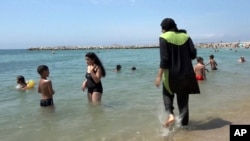Like the temperature, tensions are rising in southern France over the burkini, the skin-covering bathing suit favored by some conservative Muslim women. Rights groups say they are taking legal action against the city of Cannes, which recently banned the garment on public beaches. It is only the latest example of a broader clash on Islamic symbols in France, home to western Europe’s largest Muslim community.
Cannes - a Riviera city better known for its glitzy yearly film festival than its religious positions - quietly passed the ban late last month. In the town’s ordinance, Mayor David Lisner cited the recent terror attack in nearby Nice, along with France’s secular laws.
He says beachwear showing religious affiliation in an ostentatious way could disturb public order. Mayor Lisner told French media he considered the swimwear a symbol of Islamic extremism - but that other symbols, including the Jewish kippah and the veil - will be allowed. Another town near Cannes has reportedly passed a similar ban.
The edict comes after a water park near Marseille canceled a so-called ‘burkini day’ planned for September. Interviewed on BFMTV, parliament member Valerie Boyer, of the surrounding Bouches du Rhone region, backed that decision.
Boyer says inciting women to cover up goes against human dignity. She says the veil is not something innocent.
Muslims fight back
Muslim rights activists disagree. The French Human Rights League and the Collective Against Islamophobia say they will challenge the Cannes ban in court. Feiza Ben Mohamed, secretary-general of France’s Federation of Muslims of the South, says the ban unfairly targets Muslims …and is no answer to fighting terrorism.
“When you’re talking about Muslims, everything is a problem, everything: the food, the clothes, the swimming pools and now the beach.”
This is not the first time that burkinis -- along with other Muslim symbols -- have gotten into hot water, so to speak. Authorities have also banned the face-covering niqab, and girls from wearing veils at school.
Issues like halal food in cafeterias have also sparked tensions. Some say they contradict the country’s fiercely secular creed; opponents argue the crackdowns violate free expression.




